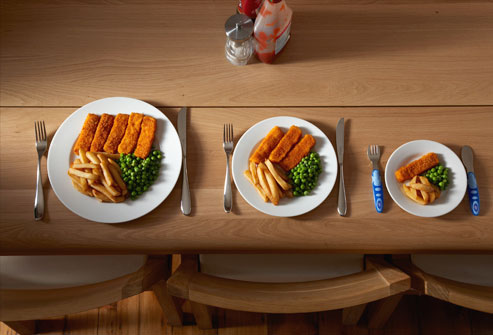“You really shouldn’t fast,” an Indian hematologist in Bahrain warned me after I had been fasting for eleven years. She cautioned me that my iron levels were alarmingly low. “I’m concerned with your liquid intake more than the food. Your stomach isn’t big enough to accommodate both.”
“Is this doctor a Muslim?” my then-husband asked. “She wouldn’t understand otherwise.”
It was true; she wasn’t a Muslim. It was also true that I had a small stomach for a fat girl. It never occurred to me that the gastric bypass I had twenty-one years ago would be the source of my Ramadan misery.
***
“Your fast only counts if you are Muslim,” a man from Syria once said to me. I was eighteen-years–old, not quite Muslim but on the cusp, when he made this assertion.

“That was a horrible thing to say,” my Lebanese friend rebutted. “Shame on him,” she chastised with a shake of her head while she spooned iftari tabbouli on my plate.
It was too late, however. I had already internalized the message that only one legitimate story existed regarding Ramadan, and shame on you if your fasting experience presented a counter narrative. I was a year out of my bariatric surgery. I should not have tried fasting with such a diminutive stomach, but my heart desired to expand in the direction of Mecca. A year after my first fast, I would be a card carrying Muslim, and no thanks to Mr. Syria.
Some are unyielding when it comes to the Holy month. As one of the main tenants of Islam, it isn’t something to casually dismiss, but for me, Ramadan arrived each year as a personal dilemma. For two decades, I desired to feel the excitement other Muslims claimed to experience, but instead of anticipation, I felt dread at what Ramadan would do to me. I kept this anxiety to myself, having always felt too embarrassed to confide, what I considered my weakness, in anyone.
I didn’t understand why fasting was so hard. And I don’t mean challenging in the expected “Oh, I’m so hungry and thirsty” sense. I had some days of easy riding, even invigoration. But a few days into the month, a lethargy would set in, so heavy that I could barely pull myself out of bed despite eating a substantial suhoor. Then, without fail, my mind would eventually behave as if encapsulated in a bell jar, foggy and indeterminate. Once I broke the fast, I’d often have to lie down until I stopped sweating and my heart ceased palpitating. A deep, penetrating sadness accompanied the exhaustion. I felt so pitiful and sad that I would curl up in bed and weep under the covers.
Others who fasted around me seemed to function, albeit more slowly, but they functioned. Pre-sunset soccer matches were the norm when I lived in Bahrain. I wondered how boys could play a full match before opening their fast and not collapse during or after. What was wrong with me–and no one else–that I could hardly walk down the stairs without tripping over my shaky legs after a week of fasting?
I hated myself during Ramadan because I felt my inability to successfully fast consecutive days meant I was failing my faith. The self-castigation was compounded by a feeling of loneliness. If I confessed my failure to anyone, it would be tantamount to an admission of guilt. Others would know I was a bad Muslim. Already a fat girl, Ramadan seemed to confirm that my soul was so entangled with the act of eating that deprivation from food and water destroyed my sense of self. I felt deeply ashamed.
***
Ramadan does something to me that it doesn’t do to many people; abstaining from food and drink for prolonged hours after several days shrinks my stomach to a fourth of the normal size. I begin the fast with a smaller stomach than most, even though my pouch has stretched to accommodate typical portion sizes twenty years post-bariatric surgery, but within a matter of days, fasting partially erases two decades of stretch.
A shriveling stomach brings with it long-term nutritional deficiencies. I have pernicious anemia, so I have to self-administer B-12 shots every few months for the rest of my life and expect intravenous iron injections every couple of years until I die.
Because of my constricted stomach pouch, I have to choose between food or liquids at iftar time. I simply do not have room for both. And because I can only digest small quantities of food at a time, I space out my mini-meals, but sixteen hour fasts often don’t leave time for a full meal post-sunset. My stomach rebels against the stretch. This would be a glorious development any other time of the year, but during Ramadan, it compromises everything. When I can neither eat enough nor consume sufficient liquids, I’m unable to replenish what I’ve lost during each fast, and after a few days, I’m operating at a deficit.
***
“You need an amended fast,” my American internist suggested in my fifteenth year of Ramadan. “You might be able to go without food, but you really shouldn’t forego fluids.” To make a point, he measured my dehydration levels and even though I was not fasting that day, I still came up parched. Apparently I functioned all the time at a level of semi-dehydration and during Ramadan this state quickly escalated. This explained my crushing fatigue, my brain fog and perhaps even my depression.
The doctor encouraged me to fast if I felt I must, but not to abstain from liquids. He offered another option: fast on alternate days. I explained to him that Muslims don’t see such amendments as legitimate.

“Is this doctor a Muslim?” my then-husband inquired, as if to prove a point.
“Does it matter?” I wanted to say, but I couldn’t muster the strength to admit that fasting left me so miserable and drained that I got nothing from it. I am sure that my resentment while fasting even left me unfit to receive God’s forgiveness, much less enjoy a state of heightened reflection.
**
Last year, I did not fast in part because I couldn’t tolerate the misery. After my divorce, I had begun to work full-time and couldn’t risk the fatigue, the diminished cognitive abilities, or the depression. I felt guilty and doleful about opting out of something I had a spiritual right to experience, but without a husband in sight, I no longer felt obligated to perform a part of my faith that left my body, and as a result my soul, depleted. I realized that I had been fasting for half of my life for the comfort and approval of others and at the expense of owning my faith experience.
This year, I wanted to fast for myself yet I worried that the sixteen-hour fast would leave me with even less time to replenish food and liquids at night. I expressed my fears to a Muslim friend. “If you can fast, then do so. But if it is too hard, that is OK,” she reassured me. “Don’t beat yourself up about it. This year’s fast is going to be challenging for everyone.”
Finally, I decided to try Ramadan again on my own stomach-shrinking terms, just as two doctors on two continents had suggested. I may not fast on consecutive days, but I will do as many as I can. I can’t always fast until the sunset prayer, but I do so until my words begin to slur from dehydration (between 4 and 6 p.m., my speech starts to falter in a humorous, almost endearing way). The decision to claim the fast within my own parameters has left me with the energy to ponder the spiritual side of Ramadan and the metaphysical aspects of deprivation. Making these slight accommodations may not feel “legit” for some, but now I feel like I can claim the experience in a way that bolsters my spirituality rather than sapping all of my energy.
If there is a lesson in this, it is to learn to speak your own truths when it comes to your faith journey. I am in my twentieth year of fasting, and this is the first time Ramadan feels right.
Deonna Kelli Sayed is a Love, Inshallah contributor, a loveinshallah.com editor, and author of Paranormal Obsession: America’s Fascination with Ghosts & Hauntings, Spooks & Spirits. She has also contributed to altmuslimah.com and Muslimah Media Watch. Deonna is currently working on a memoir. To learn more, visit her website, and join her on Facebook and Twitter.



